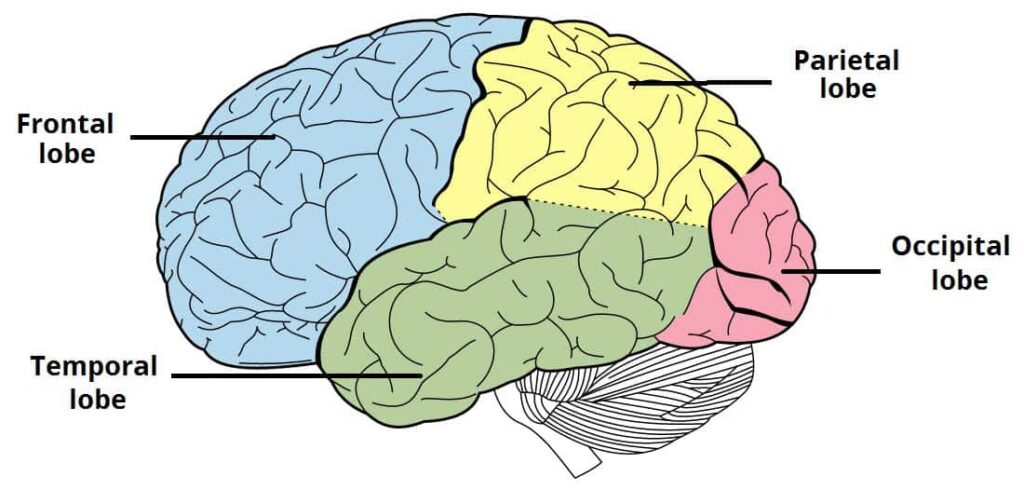Our lead therapists Ms Kerrigan and Ms Capewell talk us through executive functioning and how we can help at Burlington House and how you can help at home.
Executing functions are a set of mental skills that include organisation, attention and planning. This includes impulse control, emotional control and working memory. We all use these skills each day to work, learn and manage our lives. Issues with exectuive functioning can make it hard to focus, follow directions and handle emotions amongst other things.
The frontal lobe is responsible for much of the executive fucntioning of the brain.
Executive function begins to develop ealy in life, these skills are influence by the brain development and through the interactions that children have with people around them.Development continues through adolescence and into early adulthood. The foundation for exective function developes in the context of the early attachment relationship that infants develop with their caregivers. Babies who experience warm and supportive interactions with important adults in their lives are more likely to feel safe and secure. This sense of security from trusted caregivers helps children build confidence that allows them to comfortably explore their world, develop independence and practice problem-solving.
- In primary school, children’s executive function skills are reflected in how they solve problems, stay on task, cooperate with others, and make friends.
- In secondary school, young peoples executive function skills are refelected in how they organise their time and materials, how they manage emotions and inhibit impulsive beahaviours and sustain their focus and attention for longer periods of time
- In adulthood, Between the ages of 20-29, executive functioning skills are at their peak.
What it looks like when it’s not working
Working Memory – being able to keep information in your head
This child may have difficulty remembering instructions or key pieces of information.
Flexible Thinking – being able to deal with unexpected changes and adapt to new situations.
This child may present with ‘rigid’ thinking patterns, they will find change difficult and may find it difficult to see things from another person’s point of view.
Impulse Control – thinking before acting
This child may blurt out, talk about unrelated things and they may be more likely to engage in ‘risky’ behaviour. As an adult this might be when you say no to that tempting chocolate cake.
Emotional Regulation – being able to regulate feelings and responses.
This child may find it challenging to manage their emotions, they may have big reactions to what seems like small problems.
Self Monitoring – this is about being able to assess your own actions and make changes to be more successful.
This child may not be able to change behaviour or ask for help (because they don’t think/know they need help)
Planning and Prioritising – setting a goal, knowing how much time is needed to meet the goal and a plan on how to do it.
This child may not know how to determine what is important and may struggle to know how much time/ how to achieve a goal
Organisation – knowing how to manage thoughts and materials
This child may lose objects and forget what they were going to say.
Task Initiation – knowing how and when to get started
This child may not know where to begin – the thought of starting anything can be incredibly overwhelming.
What can impact executive function
- Trauma and exposure to toxic stress can seriously delay or impair executive function skills
- Up to 90% of those with ADHD have impaired executive function
- Some say 80% of those with autism suffer from executive function
- Depression and mental health needs have impaired executive function
- According to research on executive functions, students with learning difficulties may have deficits in the working memory system, as well as with executive functions (Rosenzweig, Krawec, & Montague, 2011).
- An injury to the front of the brain
Executive functioning in the school environment
Reading
- The ability of a child to pay attention, follow directions, and inhibit responses has been found to have a positive relationship with emergent literacy and vocabulary skills in preschoolers (McClelland et al., 2007).
- Other studies have found that reading comprehension skills are impacted by working memory and planning, self-monitoring, and shifting attention
Writing
- Teachers most often cite the importance of organisation, planning, monitoring, editing, and being able to generate ideas as skills students need to possess to be able to complete writing assignments in school. Many of the basic constructs mentioned by teachers as critical to writing are executive functions.
Arithmetic
- Deficits in inhibition, switching, and working memory abilities were found to be predictive of lower math abilities in children (Bull & Scerif, 2001). Further, it was found that the degree of facility with the executive functions of set shifting, inhibitory control, and emotional control and memory in preschool predicted early elementary school math abilities (Clark, Pritchard, & Woodard, 2010). Pupils who exhibited deficits in these areas were more likely to struggle in math later in their educational career.
How can we help?
Classroom Planning, Schedules, and Routines
- Have visuals of schedules, directions, class rules, and expectations in a place the students can see them
- Have a daily routine that changes as little as possible.
- Provide folders and a basket of supplies to keep the student’s desk organised
Giving Instructions
- Give step-by-step instructions and have the student repeat them, also have them available visually.
- Use attention-getting phrases like, “This is important to know because….”
- Check in frequently to make sure the student understands the work.
- Give simple and concrete written and spoken directions.
Building Organisation and Time Management Habits
- Use organisers and mind-mapping software.
- Use 5 minute goals – Sometimes big tasks are just too overwhelming. Students can be coaxed out of their inaction by selecting a task that should take no more than 5 minutes, setting the timer, and springing into action.
- Help the student create a daily to-do list to track assignments.
- Break down big projects into smaller pieces.
- Use coloured strips of paper when reading to help focus.
Flexible Thinking
- Model it – if you are trying to present a lesson on the board and you want a red pen, but only have black, be flexible and use the black….but TELL the kids what you are doing.
- Think of new rules for your favourite games e.g. connect 4 can become connect 6.
- When helping a child solve a problem, support them to think of three solutions before they decide on the best one.





